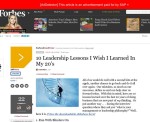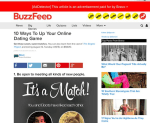The Digital Reader |
- It’s Official: US Regulators Say that Monkey’s Selfie Cannot be Copyrighted
- Ad Detector Plugin Will Tell You Whether that Post You’re Reading is Actually an Advert
- Did Thomson Reuters Really Engage in Piracy Under the Cover of an Opt-Out Clause?
- Apple Pokes at Amazon over Misquoting Orwell
- Amazon Now Sells Paper Books in Brazil
- HarperCollins Launches Their Third eBook Bundle Program
- The Morning Coffee – 21 August 2014
| It’s Official: US Regulators Say that Monkey’s Selfie Cannot be Copyrighted Posted: 21 Aug 2014 03:25 PM PDT
That famous monkey selfie which made the news a few weeks back officially has no copyright. Noting that “The Office will not register works produced by nature, animals, or plants”, the US copyright office ended the most captivating copyright debate of the year not with a bang but with the stroke of a bureaucrat’s pen. The story of the artistically-inclined macaque first made its way around the web in 2012. According to David Slater, the British photographer whose camera was “borrowed”, the monkey hijacked the camera while the photographer was on a trip to the Indonesian jungle in 2011, and took tons of pictures, including the selfie. That mischievous monkey also took this photo. I believe Slater is the one on the left:
Noting that Slater had registered the copyright to the selfie in his own name, experts opined at the time that the photos taken by the monkey were probably in the public domain because the creator was a monkey, and thus technically could not claim a copyright. That opinion was seconded a few weeks ago when Wikimedia, the non-profit behind Wikipedia, revealed that they had declined to remove a copy of the famous selfie which had been uploaded by a user. The organization had received a DMCA notice and after much internal debate decided not to take it down. In their opinion the image was in the public domain. And now the matter has been settled by the US copyright office – in the US, at least. According to The Telegraph, there is a clause in that country’s copyright law where the photographer might be able to claim that he owned the copyright:
This probably won’t help Slater; he has already admitted that the monkey stole the camera without his permission. In short, he didn’t intend to create the circumstances for the monkey to take the photo, so he can’t claim that the monkey was working for him. The post It’s Official: US Regulators Say that Monkey’s Selfie Cannot be Copyrighted appeared first on The Digital Reader. |
| Ad Detector Plugin Will Tell You Whether that Post You’re Reading is Actually an Advert Posted: 21 Aug 2014 12:37 PM PDT
That is called native advertising, and I doubt very many readers like the idea that sites as well-respected as Forbes, The Atlantic, and Newsweek are selling their editorial content to advertisers – and then not telling readers. That is why I am pleased to share a useful plugin that just came across my desk. It’s called Ad Detector, and according to the description it does exactly what the name implies:
I have installed the plugin, and I have had a chance to see it in action so I can confirm that it works. I’m told it is designed to detect content which is sponsored but not explicitly called out as such. The plugin is available for Firefox and Chrome. Here’s what it will look like in action:    While I will not yell about companies making money this way, I also think that they should be more explicit about their actions. This plugin does what they will not. You can download the plugin from the Chrome Web Store and from the Add-On page on Mozilla.org. For more details, check out the Ad Detector website. The post Ad Detector Plugin Will Tell You Whether that Post You’re Reading is Actually an Advert appeared first on The Digital Reader. |
| Did Thomson Reuters Really Engage in Piracy Under the Cover of an Opt-Out Clause? Posted: 21 Aug 2014 10:53 AM PDT A story crossed my desk this morning that has me wondering whether the third largest publisher in the world has a policy of engaging in piracy. One Indian tech blog I follow, Medianama, reported this morning on an email they got from Thomson Reuters. According to their post, Thomson Reuters said that it would take their non-response as permission to copy and distribute their articles.
Here’s the important part of the email:
Clearly that is piracy; even a non-lawyer such as myself knows that simply assuming agreement is not always valid. Yes, there is a proverb which can be summed up as “he who says nothing, agrees”, but I wish you luck in arguing that in court. This story crossed my desk earlier today, and I was all set to follow Techdirt and rip Thomson Reuters a new one, but as I got to writing the first draft of this post I started to question whether it is as serious as it sounds. I went looking for related incidents, but could not find any. Sure, I’ve seen the original email, but that is but a single email. As I got to writing the post I asked myself if this was the policy of the $5.5 billion a year conglomerate, one division, or perhaps a single office? I don’t mean to doubt Medianama, but if this were a widespread policy don’t you think it would have made a huge public spectacle? And if this is not a widespread policy then it is fair to jump up and down, and scream and shout for what could be the actions of a handful of people? I don’t know. To be honest I would have held this story if Techdirt hadn’t already posted it, and then posted it after I got my questions answered. But since it is already out there, let me ask you: Have you heard of Thomson Reuters pulling this before? What about other companies? The post Did Thomson Reuters Really Engage in Piracy Under the Cover of an Opt-Out Clause? appeared first on The Digital Reader. |
| Apple Pokes at Amazon over Misquoting Orwell Posted: 21 Aug 2014 09:41 AM PDT Never one to pass up an opportunity to make pr hay at the expense of their competition, Apple started a new promotion yesterday in the iBookstore which featured George Orwell. Re/code noticed the change, and they posted a screenshot: DBW did a little digging and showed that Orwell was the only non-contemporary author to be featured, making it clear that he was singled out for a special reason. As you probably recall (and as many of us are trying to ignore), a few weeks ago Amazon was taken to task for misquoting Orwell in their open letter to readers and authors. In talking about the then new paperback books, Orwell said that they were a great value for readers and that if publishers had any sense, they would combine against them and suppress them“. Many people criticized Amazon for taking an ironic statement literally, and using it to suggest that Orwell was advocating collusion. The funny thing is, he might actually have been arguing for collusion. While I can see how that sentence may have been meant ironically, when you read the entire statement it becomes less clear. A few days ago Hugh Howey posted the original statement that Amazon quoted, and it’s clear that he thinks cheap paperback books are bad for the publishing industry – an argument quite similar to the arguments made by the Agency publishers about cheap ebooks (and we know how that ended up). I’ve posted the complete statement below. As I read it again today I think Orwell was being ironic when he called cheap paperbacks a good value – a detail which some missed when this story broke a few weeks ago. I don’t think he liked them, but I am going to post the entire statement and let you make up your mind. (To be perfectly honest, parsing this statement requires literary analysis, so there are actually several right answers.)
The post Apple Pokes at Amazon over Misquoting Orwell appeared first on The Digital Reader. |
| Amazon Now Sells Paper Books in Brazil Posted: 21 Aug 2014 07:25 AM PDT
With titles ranging from best sellers to backlist, the retail giant is now offering a catalog of 150,000 print books from 2,100 publishers on amazon.com.br. They’re promising free delivery for orders over 69 reais, and next day delivery in select parts of Sao Paulo for orders placed before 11 am. Amazon is also promoting their book sales with a option called Read While We Ship ( Leia Enquanto Enviamos). This feature, which has been available on Amazon.com for some time, enables buyers of print books to read the Kindle version while they are waiting for the paper book to arrive. More than 13,000 books are currently available for this feature, and Amazon hopes to add more. Amazon has been interested in Brazil since at least 2011, and they were reportedly going to launch their operations in Brazil in 2012 with a focus on media (DVDs, CDs, books, ebooks), but in spite of the numerous rumors that never happened. Amazon launched the Kindle Store in Brazil in December 2012, yes, but it is 20 months later and they are still only selling paper books and ebooks. Declining to respond to rumors, Amazon has not offered an explanation for the delay.
The post Amazon Now Sells Paper Books in Brazil appeared first on The Digital Reader. |
| HarperCollins Launches Their Third eBook Bundle Program Posted: 21 Aug 2014 05:10 AM PDT
The trade publisher has signed up with Humble Bundle to offer the Bookperk ebook bundle. Unlike the print+ebook bundles, the Bookperk bundle is a time-limited offer, but on the upside the bundle does include up to 10 titles published by HarperCollins at a ridiculously low price. For the next two weeks HC and Humble Bundle are offering readers the chance to pay what they want for American Gods by Neil Gaiman, The Curse of Chalion by Lois McMaster Bujold, Twinmaker by Sean Williams, Busting Vegas by Ben Mezrich, and Map of Bones by James Rollins. Readers who pay more than the average price will also get 4 bonus titles, including: Angel's Ink by Jocelynn Drake, The Wasteland Saga by Nick Cole, By the Blood of Heroes by Joseph Nassise, and The Witch of Portobello by Paulo Coelho. And like other Humble ebook Bundles, customers who pay $10 or more will receive all of the above, as well as a bonus: a pair of titles by Kim Harrison: the novel Dead Witch Walking and Trouble on Reserve a novella. In case you were worried, I bought the bundle and can confirm that the ebooks are available as DRM-free PDF, Kindle, and Epub. Given HarperCollins has supported their other bundle projects with their own DRMed ebookstore, I for one was concerned that they might have done the same here. Luckily they did not; the ebooks in this bundle are DRM-free. This Humble Bundle supports First Book, which provides new books and educational resources to programs and schools serving children in need, the SFWA Emergency Medical Fund, and the Comic Book Legal Defense Fund. The post HarperCollins Launches Their Third eBook Bundle Program appeared first on The Digital Reader. |
| The Morning Coffee – 21 August 2014 Posted: 21 Aug 2014 02:51 AM PDT The reading list is quite short this morning. Don’t eat the yellow snow.
The post The Morning Coffee – 21 August 2014 appeared first on The Digital Reader. |
| You are subscribed to email updates from The Digital Reader To stop receiving these emails, you may unsubscribe now. | Email delivery powered by Google |
| Google Inc., 20 West Kinzie, Chicago IL USA 60610 | |



![george-orwell-apple-itunes[1]](http://the-digital-reader.com/wp-content/uploads/2014/08/george-orwell-apple-itunes1-500x326.png)
![JeffIllustration_PT_BR_Menor_500X310_V6._V344057650_[1]](http://the-digital-reader.com/wp-content/uploads/2014/08/JeffIllustration_PT_BR_Menor_500X310_V6._V344057650_1-250x155.jpg)
No comments:
Post a Comment